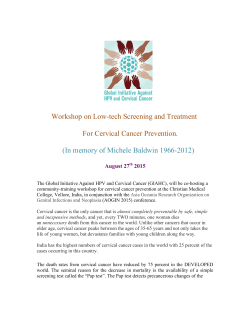
Journal of Women`s Health, Issues & Care
Singh A et al., J Womens Health, Issues Care 2015, 4:1 http://dx.doi.org/10.4172/2325-9795.1000175 Journal of Women’s Health, Issues & Care Case Report A SCITECHNOL JOURNAL Cervical Myomatous Polyp Leading to Third Degree Uterine Prolapse in Virgin Lady with Intact Hymen Nilanchali Singh1, Kuan-Gen Huang2* and Tida Kijjadip3 1Department of Obstetrics and Gynaecology, University College of Medical Sciences, New Delhi, India 2Department of Obstetrics and Gynaecology, Chang Gung Memorial University College & Hospital, Taiwan 3Women’s Health Center, Samitivej Sukhumvit Hospital, Bangkok, Thailand discharge. There was no history of urinary urgency, frequency, nocturia or stress incontinence. She had no menstrual complaints. She denied any history of sexual contact. The general physical and systemic examinations were normal. Abdominal examination did not reveal any organomegaly or any mass. When examined locally, the hymenal ring was found to be intact and the cervix was protruding out of the hymenal ring. There was a 6 x 4 cm sized, irregular, firm, polypoidal mass arising from the cervix at 4 o’clock position. The polyp had surface erosions. The consistency and appearance were suggestive of fibroid polyp. Along with the fibroid polyp, there were few ectocervical and endocervical polyps. There was no evidence of cystocele or rectocele on local examination (Figure 1). Pelvic examination was not performed and she refused rectal examination. *Corresponding author: Kuan-Gen Huang, MD, Department of Obstetrics and Gynaecology, Chang Gung Memorial University College & Hospital, Linkou, 5, FuHsin Street, Kueishan, Taoyuan, Taiwan 333, Tel: +886-3-3281200 ext 8253; Fax: +886-3-328-6700; Email: kghuang@ms57.hinet.net Rec date: July 28, 2014, Acc date: Dec 30, 2015, Pub date: Jan 05, 2015 Abstract We are reporting a rare case of cervical myomatous polyp leading to third degree utero-vaginal prolapsed in a 40 years old virgin lady with intact hymenal ring. Vaginal myomectomy was performed and the prolapse reduced gradually and spontaneously within a span of three months. The hymen remained intact after the procedure. There are reports of prolapse occurring due to cervical myoma in multiparous women but no such case in a virgin has been reported according to our knowledge after extensive search in Pubmed and Google. Such cases require conservative surgical approach as the tone of the tissues may suffice for reverting back the prolapse. Keywords: Cervical; Myomatous Prolapse; Virgin, Intact Hymen Polyp; Utero-Vaginal Introduction Leiomyomas are common uterine tumors and can occur anywhere in the uterus. Cervical leiomyomas are rare and usually occur in supravaginal portion. Occurrence in portiovaginalis is uncommon [1]. Large cervical leiomyomas can lead to uterine prolapse due to the tractional force exerted by them. There are only few reports of such pathology in literature, but, despite extensive search, we could not find a report of prolapse due to cervical leiomyoma in a virgin with intact hymenal ring [1-3]. The rarity of this case as well as the excellent results after minimal surgical intervention, lead us to report this case. Case Report A 40 year old, unmarried, nulliparous woman presented to the gynaecology clinic with complaints of mass protruding out per vaginum for last one year. Initially, the mass was reducible and protruded only while standing or walking but since last few months, it was persistently exposed. She also complained of abnormal vaginal Figure 1: Showing the cervical myoma and endocervical polyp along with the third degree utero-vaginal prolapse The routine blood and urine investigations were normal. An ultrasonography was performed which revealed otherwise, normal uterus and adnexa. Management of the prolapse was unclear since the patient was a virgin. Considering the cervical fibroid to be the sole cause of prolapse, complete excision of the fibroid polyp was planned. Prior biopsy was not performed as there were no features of malignancy. The patient was counseled regarding the treatment and she was admitted. Thereafter, vaginal myomectomy along with polypectomy was performed. After the procedure, the cervix remained 2 cm outside the introitus (Figure 2). She was discharged on third post-operative day and was advised Kegel’s exercise at home. The histopathology confirmed the diagnosis of leiomyoma. During her follow-up, we could appreciate the gradual reduction in the uterine prolapse. At her follow-up after three months of surgery, the patient was completely asymptomatic without any clinical evidence of prolapse. All articles published in Journal of Women’s Health, Issues & Care are the property of SciTechnol, and is protected by copyright laws. Copyright © 2014, SciTechnol, All Rights Reserved. Citation: Singh A, Huang KG, Kijjadip T (2015) Cervical Myomatous Polyp Leading to Third Degree Uterine Prolapse in Virgin Lady with Intact Hymen. J Womens Health, Issues Care 4:1. doi:http://dx.doi.org/10.4172/2325-9795.1000175 infected and even gangrenous as reported by Palamchamy et al., [4] Good antibiotic therapy should precede the surgical treatment in such cases. Figure 2: Showing the gradually decreasing prolapse after surgery. Intact hymenal ring can be appreciated. Discussion Cervical leiomyomas are rare tumors and have some unique complications apart from those in common with leiomyomas located elsewhere. They can lead to infections, ulcerations over the myoma, gangrenous changes, obstetric complications like cervical incompetence and obstructed labor and sometimes, utero-vaginal prolapse as seen in our case [4,5]. Oruc et al., reported a case of prolapsed, pedunculated cervical myoma causing complete obstruction of the vagina in a pregnant woman [5]. She developed preterm premature rupture of membranes and fetal demise for which abdominal hysterectomy had to be performed since vaginal approach was not possible. There are some reported cases of prolapse or even procidentia due to large cervical leiomyoma, most of them being in multipara. Suneja et al., reported a case of incarcerated procidentia due to cervical fibroid [3]. Gurung et al., reported a case cervical elongation and third degree utero-vaginal prolapse due to huge, compressed, pedunculated fibromyoma of the cervix [1]. Baum et al., also reported a similar case [2]. There are also few reports of giant cervical polyps protruding out of the introitus in nullipara and even in virgin women [6] but we could not find a case of cervical myoma leading to prolapse in such women in the literature. Large fibroid polyps with prolapse can be mistaken for uterine inversion or even malignancy, as reported by some authors [4,7]. Biopsy may not be necessary and excision can be performed as only 2% of cervical polyps are malignant [7]. Treatment of the condition depends on other associated factors like age, parity, associated comorbid conditions etc. It is preferable to perform a total hysterectomy in older women with completed family if associated with multiple uterine leiomyomas [7]. At times, the fibroid polyp may get Volume 4 • Issue 1 • 1000175 The mechanism of prolapse in cervical leiomyomais the constant dragging force applied by the myoma on the uterus. The reported cases are mostly in multipara with relatively weakened tone of the tissues. Hence, both the factors lead to uterine prolapse; requiring both myomectomy and prolapse repair for treatment, unlike our case. Our patient was a nullipara with presumably, good tone of tissues. The only factor leading to the prolapse was the pedunculated myoma in portiovaginalis. Considering this fact, we only performed myomectomy, without any measures for prolapse repair. We expected the normal tone of tissues to revert the prolapse in due course and to our content, the prolapse disappeared completely within three months. Even the hymen could be preserved; fulfilling patient’s desire. Recurrence can be prevented by early detection and treatment of cases of cervical myoma before they cause pressure leading to prolapse. Cervical myomas can be a cause of prolapse in nulliparous women with otherwise, good tissue tone. We, therefore, recommend that in cases of pelvic organ prolapse due to cervical myomas, a less aggressive surgical approach can be tried. The tone of tissues along with, Kegel’s exercise can lead to successful outcome as seen in this case. References 1. Gurung G, Rana A, Magar DB (2003) Utero-vaginal prolapse due to portio vaginal fibroma. See comment in PubMed Commons below J ObstetGynaecol Res 29: 157-159. 2. Baum JD, Narinedhat R. (2009) Cervical myoma experienced as prolapsed.J Minim Invasive Gynaecol 16: 248-249. 3. Suneja A, Taneja A, Guleria K, Yadav P, Agarwal N. (2003) Incarcerated procidentia due to cervical fibroid: An unusual presentation. Aust N Z J Obstet Gynaecol 43: 252-253. 4. Palanichamy G, Authilingom R (1976) Degenerating cervical myoma simulating chronic puerperal inversion and gangrene of uterus- (Report of a case). J ObstetGynaecol India 25: 790-791. 5. Oruç S, Karaer O, Kurtul O (2004) Coexistence of a prolapsed, pedunculated cervical myoma and pregnancy complications: a case report. See comment in PubMed Commons below J Reprod Med 49: 575-577. 6. Khalil AM, Azar GB, Kasoar HG, Abu-Musa AA, Charara IR, et.al. (1996) Giant cervical polyp: A case report. J Reprod Med 41: 619-621. 7. Abdul MA, Koledade AK, Madugu N. (2012) Giant cervical complicating uterine fibroid and masquerading as cervical malignancy. Arch IntSurg 2: 39-41. • Page 2 of 2 •
© Copyright 2025









